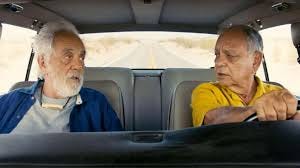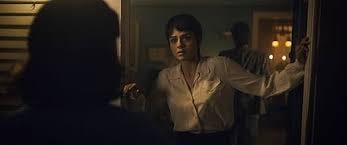Your Possible Pasts
My thoughts on Cheech & Chong’s Last Movie, Pink Floyd at Pompeii: MCMLXXII and On Swift Horses
Your Possible Pasts
Considering the fact that both musical acts and comedians from the 70s and 80s are now becoming the subjects of expansive, career-spanning documentaries, it is perhaps no surprise that Cheech & Chong, the stoner comedy duo who blended together music and jokes in an act that proved to be enormously successful on record, in live performances and on the big screen, would get that treatment at some point. Cheech & Chong’s Last Movie is an exhaustive and occasionally exhausting overview of their career structured, after a fashion, around a road trip through the desert that the two take in order to meet a friend named Dave that sparks—literally and metaphorically—memories of how the Mexican-American Marin and the Chinese-Canadian Chong first met in Canada, discovered that they shared a unique and undeniably pot-influenced comedic chemistry that made them into counter-culture heroes through sold-out concerts and hit albums featuring classic routines like “Dave’s Not Here” and “Basketball Jones” (whose origins, we learn, included the likes of Jack Nicholson and George Harrison). Sensing that they could become even bigger, their record producer, Lou Adler, financed and directed their first feature film, Up in Smoke, and when that became a massive hit in 1978, it both made them into movie stars and began to sow seeds of discord between the two that would ultimately lead to their break-up in the mid-80s.
Obviously, your views on this film will be colored to a great degree by your feelings towards Cheech & Chong in general and if you have never found them to be particularly amusing before, my guess is that nothing here is going to finally sway you. As a sort-of fan—I’ve laughed at a number of their bits and liked Up in Smoke and their underrated 1982 film Things are Tough All Over—I found myself liking it to a certain extent. Debuting director David Bushnell has uncovered an impressive amount of archival material, ranging from performance clips from their heyday as a live act to bizarre interview segments, and Cheech & Chong still demonstrate a winning chemistry together as we see them hash through their legacy, including the tensions that grew between the two largely over issues of creative control as well as their disastrous stab at drug-free comedy in the woeful Cheech & Chong’s Corsican Brothers. The problem is that by the time that the film arrives at that breakup point, the film is almost over and skims over nearly four decades of solo endeavors, legal troubles and the occasional reunion to the frustration of anyone who might like a little more detail about them. (There is nary a mention of how they wound up in Martin Scorsese’s After Hours, to cite but one peculiar omission.) Still, if Cheech & Chong’s Last Movie proves to be the last hurrah indicated by the title, it makes for a reasonably entertaining look back at their careers while at the same time making a case for their inclusion in the comedy pantheon
.Another blast from the past arrives in the form of Pink Floyd at Pompeii: MCMLXXII, a digitally revitalized edition of the legendary rock group’s 1972 concert film that found them, in a direct rebuke to concert films of the time like Woodstock that focused so much footage on the audience, playing in the empty amphitheater in Pompeii in 1971, though the sequences showing them playing at night were shot later in Paris. In between playing such early classics as “Echoes,” “One of These Days,” “Careful With That Axe, Eugene” and “A Saucerful of Secret” (complete with Roger Waters going nuts on a gong), we also get to see the group wandering among the ruins and, in sequences added later to pad things out, in Abbey Road Studios as they are working on their next album, a little thing called The Dark Side of the Moon. Although some of the attempts at psychedelic imagery may seem a little hokey today, the music sounds fantastic throughout (you should make a point to see this in a theater with the best sound system available) and while those scenes weren’t part of the original conception, the studio sequences are interesting, both for the way they offer up a view of the famously fractious group working together and for how it captures them at the precise moment when they were about to shift from a trippy cult band to one of the biggest groups in the world. Again, this may not be the best way to try to introduce the group to someone unfamiliar with their work but if you are a fan, Pink Floyd at Pompeii: MCMLXXII gives you a chance to once again experience one of the quirkier points in their long career in the way that it was truly meant to be seen
.Set in the 1950s, Daniel Minihan’s On Swift Horses opens with Lee (Will Poulter) and fiancée-to-be Muriel (Daisy Edgar-Jones) being visited in Kansas by the former’s brother, Julius (Jacob Elordi), who has just returned from the war in Korea. Although Lee is excited to see his somewhat willful brother, it is Muriel who winds up forging an instant unspoken connection with him and this leads to the three making plans to relocate to California. However, while Lee and Muriel do make the journey, Julius only makes it as far as Vegas, initially making a living as a card sharp and hustler before taking a job spotting cheaters at a casino. There he meets co-worked Henry (Diego Calva) and the two begin a passionate affair that ends up taking a turn when Henry gets the idea of the two of them working as a team to cheat other casinos on their own. Meanwhile, Muriel, making use of the tips that she overhears at her job as a waitress, begins betting at the local racetrack, where she makes a large sum of money that she elects to conceal from Lee, still pretending to work at her job. When she isn’t playing the ponies, she finds herself drifting into an affair with neighbor Sandra (Sasha Calle), again without Lee noticing anything.
The film is based on the novel by Shannon Pufahl and, for all I know, perhaps it worked better on the page. On the screen, however, the results are somewhat of a mess, albeit a good-looking mess, thanks to the lovely visual contributions from cinematographer Luc Montpellier. The big problem is that Bryce Kass’s screenplay is trying to juggle so many storylines and characters in just under two hours that very little of it winds up resonating in any particular way. While the film is about characters who are forced to keep their true feelings bottled up for most of the running time, it winds up succumbing to that very same problem itself—Minihan keeps us at such an emotional distance throughout (even the sex scenes are strangely devoid of any sense of passion or heat) that it becomes impossible to work up much sympathy or interest in them or their respective plights. Matters aren’t helped by the fact that there is a lack of any real chemistry between the two secret couples, making their respective plights and conflicts less than gripping. The only duo that evokes a convincing rapport is Edgar-Jones and Elordi, who do a very good job of subtly suggesting that they recognize just how much their characters have in common—alas, because of the nature of the narrative, they only have a couple of scenes together before going off on their less-interesting ways. On Swift Horses has good intentions and a better cast but what should have been a powerful portrait of people trying to find their places in the world during a less-accepting time is instead nothing more than a dry and draggy soap opera.




